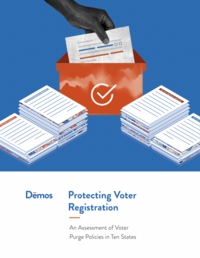Executive Summary
An inclusive democracy demands full access to the ballot by all eligible voters, yet many states use election procedures that create unnecessary burdens on the right to vote.
An inclusive democracy demands full access to the ballot by all eligible voters, yet many states use election procedures that create unnecessary burdens on the right to vote. This report focuses on an important but often overlooked voting barrier: voter purges. Too often, registered voters are kicked off the voter rolls in error, with little or no notice and opportunity to correct the error. When these voters show up to the polls, they may be turned away and their voices silenced—even though they are fully eligible to vote.
Download the full report
Between the close of registration for the 2020 general election and the close of registration for the 2022 general election, states reported removing 19,260,000 records from their voter registration rolls. This was equal to 8.5% of the total number of voters who were registered in the United States as of the close of registration for the 2022 general election. Of course, some removals are necessary for the proper maintenance of voter rolls, such as for persons who have died or have moved away from their voting jurisdiction. One of the most frequent reasons for purging, however, was “inactivity,” or failure to respond to a confirmation notice and not voting in at least two consecutive federal general elections. This reason accounted for more than a quarter of all removals while 26.8% and 25.6% were for address change or death of the registrant, respectively.
Flawed voter purge practices–such as removals for inactivity or based on inaccurate identification of felony status or citizenship status—often disproportionately target voters of color, naturalized citizens, and other communities[.]
Flawed voter purge practices–such as removals for inactivity or based on inaccurate identification of felony status or citizenship status—often disproportionately target voters of color, naturalized citizens, and other communities, and can prevent many eligible persons from exercising their right to vote. In addition, too many states lack readily available data on voter purges, which prevents advocates, organizers, and voters from stopping improper purges before they happen or correcting an erroneous purge in time for an election. As a result, tens of thousands of eligible voters who have taken all the necessary steps to exercise their right to vote are wrongly prevented from making their voices heard in our democracy.
Dēmos conducted an analysis of voter removal practices, the safeguards in place to protect eligible voters from disenfranchisement, and the accessibility and transparency of voter registration data across ten states: Arizona, California, Georgia, Indiana, Louisiana, Michigan, North Carolina, Ohio, Texas, and Wisconsin. The voter removal laws we analyzed include both routine list maintenance laws—those allowing election officials to remove voters who have moved, died, or otherwise become ineligible to vote—and more problematic practices, such as laws targeting voters for removal for not voting (also known as a “use it or lose it” process), allowing mass third-party challenges to voters’ registrations, and granting catch-all removal authority to election officials without proper safeguards. We evaluated these states on four dimensions:
- Does the state follow practices that minimize the risk of erroneous removal?
- Does the state have safeguards in place that allow persons who were erroneously purged to correct their information and vote at election time?
- Does the state have accessible data on voter removals?
- Does the state provide transparency on the reasons for removal and other data allowing an analysis of whether removals are improperly targeting specific demographic groups?
We chose these ten states because their voter removal laws and safeguards, as well as the accessibility and transparency of their registration data, provide representative examples of the spectrum of laws and practices across the United States. Additionally, many of these state legislatures are either considering bills or have recently enacted laws that impact how voters are removed from the voter rolls. In the 2022 legislative session, state lawmakers introduced at least 43 bills that would allow or require problematic voter purges, and in 2023, as of the writing of this report, states are considering at least 28 additional bills.
We found that none of these states received a perfect score for removal practices or for safeguards against erroneous removal, which are the most important in protecting ballot access for eligible voters. Only a few states received a perfect score on data accessibility or transparency, but good data alone will not prevent eligible voters from being inappropriately purged.
All ten states must modernize their removal practices to ensure that only ineligible voters are removed from the rolls, and all need better systems to ensure that erroneously removed eligible voters can re-register and vote in the current election. Additionally, almost all these states need improved policies to ensure that they collect and publish voter registration data in an accessible and transparent format. While we examine only a subset of states, we know from work with partners in other states that the problems identified here are not confined to these ten states but are likely representative of issues across the entire United States.
Bottom line: Every examined state must improve its laws and practices to guard against improper voter registration purges. Further, based on our analysis of these ten states, we suspect the issues documented within this report are widespread and must be examined and addressed in states nationwide. We offer actionable solutions here to ensure that no voter is removed from the rolls without a legitimate reason—and that no eligible voter is denied the right to vote because of administrative malfunctions. By following these recommendations, states can improve their voter removal practices and protect the strength of our democracy while ensuring the integrity of their voter registration rolls.

